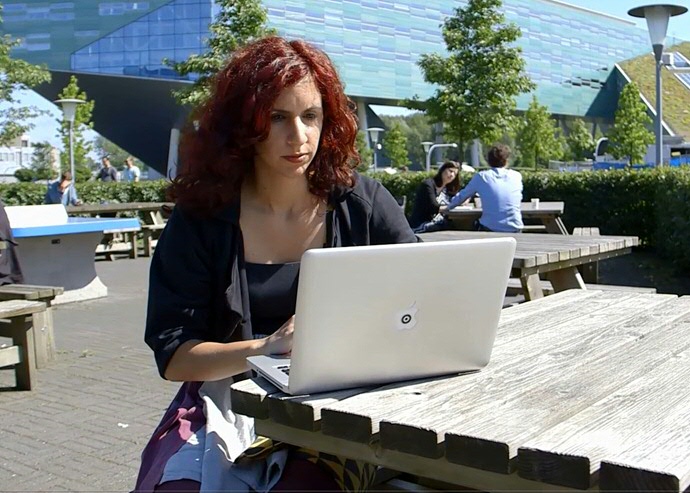An app to regulate digital distractions

In this information age it is not easy to concentrate on your work. Chats, e-mails, social media… they all distract you from your work. And even if you turn off all notifications, a slow loading webpage can have you reaching for your smartphone. From her PhD research on distractions, Ioanna Katidioti concluded that they activate cognitive processes that are not then in use, and that an app that regulates these distractions might help.
Ioanna Katidioti began by studying why people allow themselves to be distracted. ‘We often interrupt our own work to do something else, like watch a cat video’, she says. In her first experiment, the participants were asked to search for product information on the web, while chat messages popped up to distract them. In general, the participants finished the task before responding to the messages. ‘This is a rational choice’, says Katidioti.
But if, in the same experiment, the web browser was very slow, the participants responded sooner to the chat messages. ‘And they then forgot important information and took longer to finish the task. They no longer behaved rationally.’
Cat video
In a second experiment, the participants were asked to perform a task while a cat video played in the corner of the screen. Half of the participants were given a visual task. The harder the task, the less they watched the video. The other half were given a mathematical equation to solve. For them, the opposite was true: the harder the task, the more they watched the video.
The explanation for this is that the visual brain system was idle while the brain was hard at work on the maths equation. ‘Distractions seem to occur in a part of the cognitive system that is not in use.’ These observations fit in well with the general cognitive model that Katidioti’s PhD supervisor Niels Taatgen has developed.
Brain activity
In a subsequent experiment, Katidioti compared self-interruptions with external interruptions. She found that the participants’ work suffered more from the self-interruptions than from interruptions generated by the computer. ‘We also registered pupil diameter, which is a measure of brain activity. The brain was very active just before a self-interruption.’ The decision to self-interrupt seems to take ‘processing time’.
App
Although Katidioti’s work is part of a fundamental research project, it could have a practical application. ‘More work is needed, but if we could find a way to measure pupil diameter with a smartphone camera, we could build an app that would only allow interruptions at certain times.’ But for now, we have to manage them ourselves. ‘In that respect, my work has taught me the right moment to interrupt my work, which is really useful. You can’t avoid cat videos, but you can at least regulate your viewing of them.’
CV
Ioanna Katidioti studied Cognitive Science at the University of Athens. Her PhD research was part of Professor Niels Taatgen’s ERC Starting Grant project ‘Towards Safe and Productive Human Multitasking’. Katidioti has been defending her thesis ‘Understanding and managing interruptions. How to avoid watching cat videos all day long’ at the University of Groningen on 24 June 2016. She now works at the IBM Client Innovation Center in Groningen.
More news
-
26 January 2026
Science for Society | The AI chip of the future
-
20 January 2026
Alcohol, texting, and e-bikes
